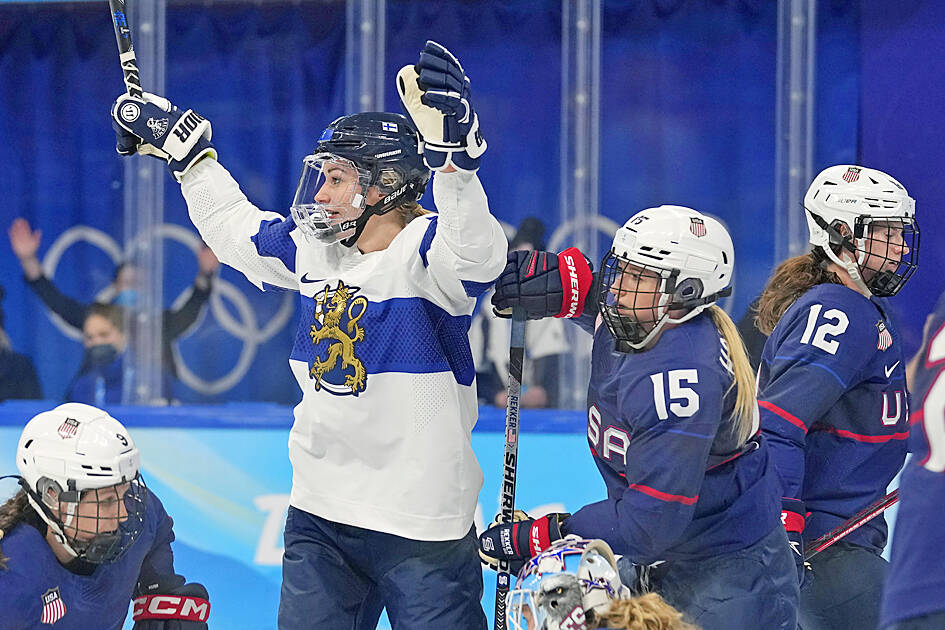Jet-lagged following a transatlantic flight after spending a weeklong stretch with Finland’s national women’s hockey team, Susanna Tapani was in the back of a cab headed to her adopted new home in the Twin Cities upon learning she had been traded to Boston.
“I’m pretty sure I was kind of like laughing and I was like in a shock,” Tapani said this week, recalling her surprise in being part of the newly launched Professional Women’s Hockey League’s (PWHL) first trade on Sunday last week.
“I didn’t even make it home, and you’re telling me that I got traded,” Tapani said, remembering what she told Minnesota general manager Natalie Darwitz.

Photo: AP
“It was like: ‘Oh my God. OK.’ It was hard to believe,” she said.
It was a reminder about the reality of the professional ranks for Tapani and Minnesota teammate Abby Cook, who were shipped to Boston, as well as for Sophie Jaques heading the other way in the three-player swap.
“I didn’t see it coming,” Jaques said. “I honestly don’t think it set in until I stepped on the ice here in Minnesota.”
While the prospect of being traded was always a possibility for those competing in the six-team PWHL, the reality of a deal being struck some six weeks into the first year was still considered stunning in a sport where in-season player movement was a rarity.
Historically, most female players in the US spent much of their careers tied to one or two places, be it their respective colleges or national teams and those who pursued careers in previous pro leagues generally stayed put because they had secondary jobs, and their playing salaries were too low to cover the cost of packing up and moving at a moment’s notice.
What is changed with the PWHL is a salary structure ranging from US$35,000 to US$80,000 not including bonuses, coupled with a collective bargaining agreement that features monthly US$1,500 housing stipends and compensation for relocation costs.
The trade became the first to put relocation clauses to the test, while creating some initial confusion among the players involved.
Jaques and Cook left their cars behind, unsure of how to get them to their new cities.
A Google search showed that the cost of shipping a car from Boston to Minnesota ranges from US$771 to US$1,205.
The PWHL caps relocation expenses at US$2,500 and has no additional provision for car shipments.
Another issue players are awaiting feedback on is how the process works with having to break their leases, for which the PWHL provides up to US$1,500 in compensation.
Jaques has the benefit of being reunited with former Ohio State teammates Liz Schepers and Clair DeGeorge in Minnesota. Schepers already has Jaques living in a spare bedroom of her home.
“If I didn’t have them two, I think I would be a lot more lost,” Jaques said.
Cook said PWHL officials have been in contact to help with the challenges of relocation.
“They’ve been asking and trying to learn about what we’re going through, so yeah, I think it’ll be different for the next lucky girl that gets traded,” Cook said.
There is anticipation that more trades will happen before the deadline next month.
“When that first one happens then it snowballs,” Darwitz said. “I was reached out to about another potential trade, but it’s like: ‘Hey, just because I made one isn’t like I’m going to be shooting from the hip here and doing a bunch.’”
At 30, Tapani is accustomed to change, having previously played in pro leagues in Finland, Sweden and Russia. It helped, too, that she was traded with Cook, who was her roommate this season.
“If this would have happened to me like 10 years ago, I think I would have felt different,” she said. “I just try to be myself and play to my strengths. I knew that it’s a possibility to get traded, but it’s definitely a professional league, and it’s a business. You just have to prepare for anything.”

Shohei Ohtani and Clayton Kershaw on Friday joined their Los Angeles Dodgers teammates in sticking their fists out to show off their glittering World Series rings at a ceremony. “There’s just a lot of excitement, probably more than I can ever recall with the Dodger fan base and our players,” manager Dave Roberts said before Los Angeles rallied to beat the Detroit Tigers 8-5 in 10 innings. “What a way to cap off the first two days of celebrations,” Roberts said afterward. “By far the best opening week I’ve ever experienced. I just couldn’t have scripted it any better.” A choir in the

After fleeing Sudan when civil war erupted, Al-Hilal captain Mohamed Abdelrahman and his teammates have defied the odds to reach the CAF Champions League quarter-finals. They are today to face title-holders Al-Ahly of Egypt in Cairo, with the return match in the Mauritanian capital, Nouakchott, on Tuesday next week. Al-Hilal and biggest domestic rivals Al-Merrikh relocated to Mauritania after a power struggle broke out in April 2023 between the Sudanese army and a paramilitary force. The civil war has claimed tens of thousands of lives and displaced more than 12 million people, according to the UN. The Democratic Republic of the Congo-born Al-Hilal

The famously raucous Hong Kong Sevens are to start today in a big test for a shiny new stadium at the heart of a major US$3.85 billion sports park in the territory. Officials are keeping their fingers crossed that the premier event in Hong Kong’s sporting and social calendar goes off without a hitch at the 50,000-seat Kai Tak Stadium. They hope to entice major European soccer teams to visit in the next few months, with reports in December last year saying that Liverpool were in talks about a pre-season tour. Coldplay are to perform there next month, all part of Hong Kong’s

Shohei Ohtani, Teoscar Hernandez and Tommy Edman on Thursday smashed home runs to give the reigning World Series champions the Los Angeles Dodgers a 5-4 victory over Detroit on the MLB’s opening day in the US. The Dodgers, who won two season-opening games in Tokyo last week, raised their championship banner on a day when 28 clubs launched the season in the US. Dodgers manager Dave Roberts shuffled his batting lineup with all four leadoff hitters finally healthy as Ohtani was followed by Mookie Betts, then Hernandez and Freddie Freeman in the cleanup spot, switching places with Hernandez. “There’s a Teoscar tax to